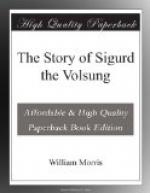Therewith from his belt of battle he raised
the golden sheath,
And showed the peace-strings glittering
about the hidden death:
Then he laid his hand on the Branstock,
and cried: “O tree beloved,
I thank thee of thy good-heart that so
little thou art moved:
Abide thou thus, green bower, when I am
dead and gone
And the best of all my kindred a better
day hath won!”
Then as a young man laughed he, and on
the hilts of gold
His hand, the battle-breaker, took fast
and certain hold,
And long he drew and strained him, but
mended not the tale,
Yet none the more thereover his mirth
of heart did fail;
But he wended to the high-seat and thence
began to cry:
“Sons I have gotten and cherished,
now stand ye forth to try;
Lest Odin tell in God-home how from the
way he strayed,
And how to the man he would not he gave
away his blade.”
So therewithal rose Rerir, and wasted
might and main;
Then Gunthiof, and then Hunthiof, they
wearied them in vain;
Nought was the might of Agnar; nought
Helgi could avail;
Sigi the tall and Solar no further brought
the tale,
Nor Geirmund the priest of the temple,
nor Gylfi of the wood.
At last by the side of the Branstock Sigmund
the Volsung stood,
And with right hand wise in battle the
precious sword-hilt caught,
Yet in a careless fashion, as he deemed
it all for nought:
When lo, from floor to rafter went up
a shattering shout,
For aloft in the hand of Sigmund the naked
blade shone out
As high o’er his head he shook it:
for the sword had come away
From the grip of the heart of the Branstock,
as though all loose it lay.
A little while he stood there mid the
glory of the hall,
Like the best of the trees of the garden,
when the April sunbeams fall
On its blossomed boughs in the morning,
and tell of the days to be;
Then back unto the high-seat he wended
soberly;
For this was the thought within him; Belike
the day shall come
When I shall bide here lonely amid the
Volsung home,
Its glory and sole avenger, its after-summer
seed.
Yea, I am the hired of Odin, his workday
will to speed,
And the harvest-tide shall be heavy.—What
then, were it come and past
And I laid by the last of the sheaves
with my wages earned at the last?
He lifted his eyes as he thought it, for
now was he come to his place,
And there he stood by his father and met
Siggeir face to face,
And he saw him blithe and smiling, and
heard him how he spake:
“O best of the sons of Volsung,
I am merry for thy sake
And the glory that thou hast gained us;
but whereas thine hand and heart
Are e’en now the lords of the battle,
how lack’st thou for thy part
A matter to better the best? Wilt
thou overgild fine gold
Or dye the red rose redder? So I
prithee let me hold
This sword that comes to thine hand on




